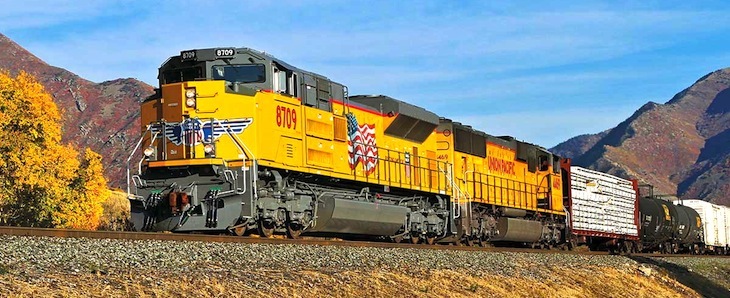Union Pacific to cut 750 jobs companywide, no word on Arkansas operations
by August 16, 2017 2:18 pm 983 views

Union Pacific Corp., which operates more than 1,300 miles of railroad track in Arkansas, announced plans to cut up to 750 jobs that will impact management and administrative positions across the company’s operations.
According to an 8K filing with the Securities and Exchange Commission (SEC), Union Pacific’s board of directors approved and initiated the personnel reorganization plan to further its “ongoing efforts to increase efficiency and more effectively align company resources.”
“The Plan will implement productivity initiatives identified during a recently completed company-wide organizational review,” the SEC filing stated. “The Plan is expected to be substantially complete by Sept. 30, 2017, to affect up to 750 employees, and to provide approximately $110 million in annual productivity savings.”
In response to a Talk Business & Politics inquiry about the company’s Arkansas operations, Union Pacific officials provided a statement that said a management employee workforce reduction program will reduce approximately 500 management positions by mid-September, while another 250 non-management positions will also be reduced at the same time.
“Union Pacific for some time has leveraged employee attrition and technology to reduce general and administrative costs,” said Union Pacific Chairman and CEO Lance Fritz. “Unfortunately, attrition alone will not keep pace with our need and ability to reduce these costs.”
The new job cuts, which do not include the company’s executive ranks, follow the railroad giant’s announcement last month that the company’s workforce levels had declined 2% in the second quarter, which were a part of an earlier company productivity initiative to align critical sources with current market demand.
The railroad giant’s downsizing efforts are expected to result in a third quarter pretax charge of nearly $90 million from employee-termination benefits, including pension expenses, severance costs, and acceleration of equity compensation. One-time cash expenditures for severance payoffs will total nearly $15 million, SEC filings show.
At the end of the second quarter, approximately 1,100 Union Pacific employees across all divisions were either furloughed or in alternate work status, and approximately 1,400 locomotives were in storage, company filings show. Two years ago, Union Pacific first announced plans to furlough more than 2,000 workers due to fewer railroad carloads across the railroad giant’s 32,000-mile transportation network.
According to information provided by company spokeswoman Raquel Espinoza, Union Pacific’s annual payroll of nearly $227 million in 2016 supported 2,654 employees in Arkansas. At the same time, the company invested nearly $133.6 on the company’s railroad infrastructure and made in-state purchases of nearly $35 million. Between 2010 and 2015, Union Pacific invested more than $760 million in Arkansas’ transportation infrastructure, according to past and updated information provided to Talk Business & Politics.
Statewide, Union Pacific operates over 1,325 miles of track, and North Little Rock is home to the company’s largest and most modern locomotive repair shop and second-largest freight car classification yard in the railroad operator’s network that covers more than 32,000 miles of track across the U.S.
By volume, the top five commodities shipped from Arkansas over Union Pacific tracks in 2016 included wholesale intermodal freight, stone and gravel, rice, sugar and other dry commodities, auto parts and non-metallic minerals. The top five commodities shipped by train to Arkansas were wholesale intermodal freight, coal, auto parts, industrial chemicals and grain.
For the first 32 weeks of 2017, U.S. railroads reported cumulative volume of 8,260,255 carloads, up 5.1% from the same point last year; and 8,513,076 intermodal units, up 3.2% from last year. Total combined U.S. traffic for the first 32 weeks of 2017 was 16,773,331 carloads and intermodal units, up 4.2% compared to last year.
A recent study by Towson University’s Regional Economic Studies Institute has found that in 2014 alone, major U.S. railroads supported approximately 1.5 million jobs, nearly $274 billion in annual economic activity, and almost $88 billion in wages and $33 billion in tax revenues.
